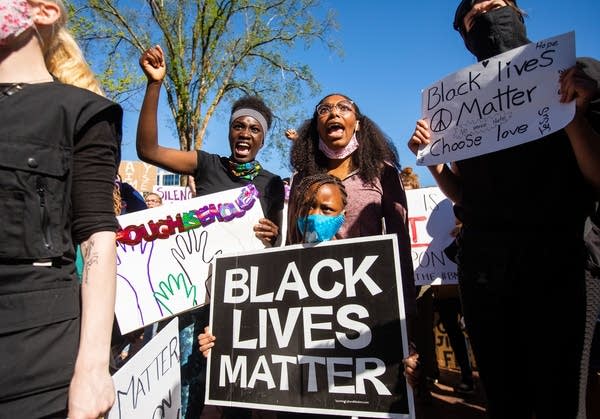‘She saw me in George Floyd’: The trauma of watching another black person die

Go Deeper.
Create an account or log in to save stories.
Like this?
Thanks for liking this story! We have added it to a list of your favorite stories.
When he was growing up, Gage Lockhart lived in south Minneapolis near where George Floyd was killed.
He doesn’t live there anymore, but he still has friends there. So, the last few weeks have been a little close to home.
“I felt a very very deep sense of despair, like helpless,” he said, about when he heard about the killing, in which Floyd pleaded he couldn’t breathe as a white officer knelt on his neck for nearly nine minutes. “You don’t even put cattle down like that. I didn’t watch the whole thing. I couldn’t. I turned away.”

The video is disturbing to most people. But for African Americans, watching yet another incident of police killing a black person is particularly traumatic.
Turn Up Your Support
MPR News helps you turn down the noise and build shared understanding. Turn up your support for this public resource and keep trusted journalism accessible to all.
And the psychological distress caused by incidents like Floyd’s death doesn’t go away — even if the officers have been charged and many of the protesters have headed home. One recent study said police shootings can affect people’s mental health for three months or more, and repeat trauma makes it all worse.
“The most simple understanding of trauma is that it’s a closeness to death,” said Marlee Dorsey, a Minneapolis therapist whose practice focuses on trauma in the black community. “So, for any person witnessing someone die is going to be a traumatic experience a lot of the time.”
She said that the number of people who called her office tripled in the week after Floyd’s death, and that she has more calls than she has appointments available.
The mental anguish goes beyond the fact that the Floyd video is upsetting, she said.

“A lot of my clients when they see the videos, they think about their own experiences with the police, which have not been very positive, or their friends’ experience with the police, or their parents’ or their grandparents,’” she said.
Lockhart said that’s true for his daughter, who’s 17. Lockhart’s father was African American; his mother Irish and Italian. He said his children — whose mother is also Irish and Italian — look white, but they feel part of the African American community.
“You know, she saw me in George Floyd,” he said. “She certainly saw her papa, my dad, who’s dark-skinned, in George Floyd. She certainly saw my friends in George Floyd.”

Deritte Fernandez is an old friend of Lockhart who lives in Texas now. He said his 11-year-old son started having trouble sleeping after he saw the video of Floyd’s killing.
“He came down in the middle of the night,” he said, “Twelve o’clock or so, to my wife’s side of the bed and said, ‘My stomach doesn’t feel well.’”
When Fernandez asked him about it later, his son said he couldn’t stop thinking about Floyd and what happened to him.
It makes Fernandez angry that even though things have changed, they haven’t changed that much.
“I still have to have these conversations with my son in a similar way my dad had these conversations with me 30 years ago,” he said.

It also reminds him of when he was in college and would drive from Minnesota home to Arkansas or to see family in New Orleans: He recalls officers stopping and searching his car —more than once — in every state between Minnesota and Louisiana.
Those kinds of experiences can add up, said Katie Lingras, a professor at the University of Minnesota whose work focuses on children who have experienced traumatic events.
“The thing with trauma is any one incident, any sort of stressful interaction or experience, neurobiologically amps us up,” she said. “It sets our response and our threshold a bit lower for how quickly we are to respond, how much we’re going to be stressed by an experience.”
Lockhart said there’s something else, too: the stress of the balancing act with his kids.
On the one hand, it’s figuring out how to keep them safe — whether it’s his older son, who was involved in protecting the neighborhood during the unrest, or his younger son who hangs out with his African American friends in their mostly white neighborhood.
On the other hand, he hates that his kids worry about him — and the fact that they have to. Like so many black parents, he’s had to make sure his sons and their friends know how they need to behave around the police.
“You’re also trying to get them to understand that you shouldn’t have to do this, but at the same time, you have to,” he said.


